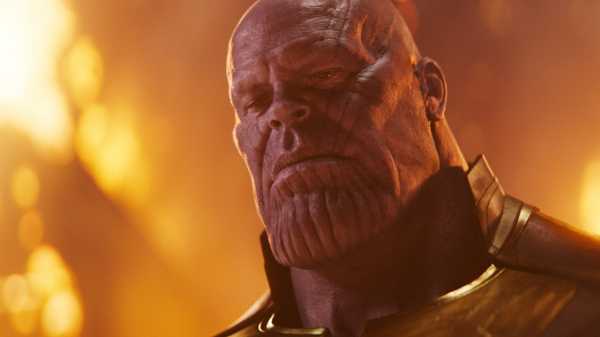
“Avengers: Infinity War” is a very peculiar movie. It runs for two and a half hours, and its spectacular action, effects, histrionics, and noises fill big screens and cavernous theatres with their colossal churning and yowling. Yet its roiling action is beside the point, serving mainly to illustrate the movie’s main idea: to give each one of its dozens of characters from the Marvel Cinematic Universe a few moments to shine. In the well-worn divide between plot-driven dramas and character-driven ones, “Avengers: Infinity War” falls strangely and surprisingly into the latter category.
For that matter, although there’s nothing small scale about “Avengers: Infinity War,” it only resembles a movie. It comes off not even as a single drama, as a self-contained and internally structured narrative, but, rather, as a big-screen, two-and-a-half-hour variant on a single episode in a television series. “Avengers: Infinity War” would make little sense in the absence of its pack of predecessors. Its characters aren’t introduced; they just show up, and their behavior is entirely defined by the template set for them in other movies. Not only does “Avengers: Infinity War” presume that viewers have seen all the preceding films in the Marvel series but, worse, it presumes that they’ve thought about them afterward.
And for those who haven’t, there’s always streaming: “Avengers: Infinity War” may be the first movie that functions as a full-length ad for the binge-watching of a virtual series, whose episodes, having been released one by one in theatres over the course of many years, are now simultaneously and instantly available to be streamed. The insubstantiality of the film isn’t due to the infinite yet flimsy malleability of C.G.I. gimmickry but, instead, to the dispersion of its drama throughout the many cinematic installations set in the Marvel Cinematic Universe. The significance of nearly every scene is outsourced to one of the previous movies in the series. What’s more, “Avengers: Infinity War” seems built to be seen and re-seen; the directors, the brothers Anthony and Joe Russo, pack the film’s transformations and effects into vertiginous camera plunges and surges and swish pans, winks and asides—a realm of sheer visual complexity waiting to be parsed in detail on repeating viewings. If the Russos don’t offer a substantial quality of imagination to fill out the mental space of the movie’s running time (or, for that matter, of any one of its scenes or even shots), they at least offer a generous, even a profuse, quantity of it.
The movie, written by Christopher Markus and Stephen McFeely, is built around a straightforward and classic MacGuffin: there are six small and gem-like stones at large in the universe—the stones of space, reality, power, soul, mind, and time. Each one endows its bearer with one particular power, but whoever collects all six (as if they came in boxes of breakfast cereal) gets total, unprecedented, presumably irresistible control of the universe. A villain named Thanos (Josh Brolin), endowed with a leathery face and a bulbous, striated chin, wants them; the superheroic Marvel-sphere unites to prevent him from getting them.
Thanos’s plot is explicitly, enthusiastically genocidal (of his own his murderous efforts to make “trillions cease to exist,” he offers the Nazi-like assertion that “The hardest choices require the strongest wills”), and the movie resounds and rumbles throughout with a megalomaniacal energy that plays like arena-Wagner. It comes complete with hardcore light shows; absurd heroic gestures amplified by visual and sonic clamor; the neo-medievalism of weaponry forged by a dwarf master smith (Peter Dinklage), and enough varieties of Liebestods to fill the Met’s whole season. Yet there’s a huge mistake in “Avengers: Infinity Wars”: its music. Alan Silvestri’s score is entirely, blaringly functional if not memorable—but, with its symphony-orchestra battalion of winds, strings, and kettledrums, it’s in the wrong genre altogether. What the movie calls out for, what it suggests from the start, is the electrified fury of throwback heavy-metal—hair-metal. That the overlords of production didn’t see fit to commission that kind of music suggests, dismayingly, that they possessed no desire to distract from the thudding and thrashing that the Russos depict onscreen.
Nonetheless, with dozens of characters popping in and out of the action, and the storyline absurdly extended to create enough little slots for each character to get a one-line aria (written in the universal language of snippy screenwriter-ese), the actors hardly seem like they’re there at all—they’re only given celebrity cameos. None of the dramatic threads has any psychological impact, with one exception—the ongoing struggle of Bruce Banner (Mark Ruffalo) to bring out his inner Hulk. “Avengers: Infinity Wars” favors not a full range of performance but a style marked by the tone of the voice, the sculpting of moments through sharp diction, which is why the actors who make the strongest impressions in the film are Robert Downey, Jr., and Danai Gurira. Also, the character of Wanda Maximoff has been written large, and Elizabeth Olsen makes something distinctive of the role: with her low-key, nearly neutral manner, she offers a virtual mumblecore off-the-street authenticity among the gloss of more polished movie stars.
But then there’s that ending. The movie feels like a two-hour-long setup for a single sprint of conflicts that offer unexpected reversals. T’Challa, as he promised at the end of “Black Panther,” makes good on his plan to open Wakanda to the world, and, when the other heroes are in need of allies to defeat Thanos, he invites them in. At first, the ingenuity of Wakandan technology and strategy prevails; but then things go haywire there, as they do elsewhere in the universe. Thanos wreaks havoc and leaves a trail of misery in his wake, and the most powerful impression left by the movie overall is its sense of bewilderment and betrayal, of mightily mournful and unreconciled desolation that feels, inescapably, like an allusively emotional transcription of the current American political landscape. (Even the title suggests a comment on the current state of American foreign policy.)
But that ending is also a narrative cheap shot, because it doesn’t feel like an ending—it feels like the turning point of a movie that is about to enter its heroic final act (which, in this case, will instead be the sequel). The ground rules governing the film’s superheroics are undefined and limitlessly malleable: infinite powers mean infinite dramatic possibilities, and none of the limitations by which real lives and choices are constructed and compelled. That’s why, for all the colossal C.G.I. kinetics and pyrotechnics of the movie’s massive battles and thudding fights, the stakes seem so low. Even the surprising deaths of beloved characters, for all their momentary power to disturb, feel cheap, because the powers of superheroism—amped up by the reversibility of time thanks to the time stone—make no result seem conclusive, no death seem final. The redemptive heroics that are doubtless forthcoming in the next episode are little to look forward to; they have the inevitability of the calendar. The only thing to hope for is a little meta-playfulness: if the producers had a sense of humor, they might give Thanos, with his infinite powers, the ability to control even the Marvel Cinematic Universe itself. Imagine, for instance, a world in which he could go back in time to reëdit “Avengers: Infinity War” and make himself come out not the villain but the hero.
Sourse: newyorker.com






